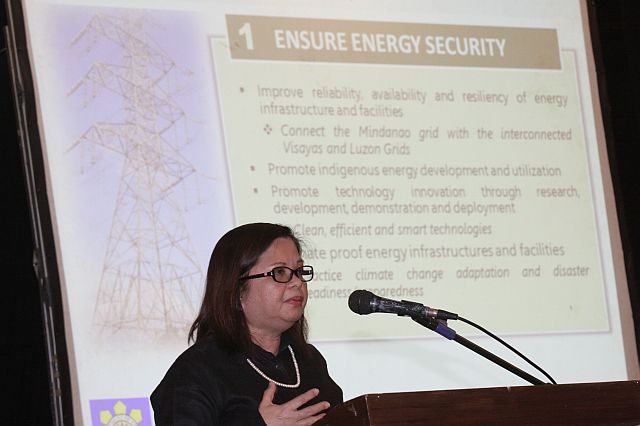DOE to cut 100 signatures needed for power projects

Carmencita Bariso, assistant director of the Department of Energy’s energy policy and planning bureau, discusses the agency’s roadmap for the next couple of years during a forum at the Radisson Blu Hotel Cebu (CDN PHOTO/JUNJIE MENDOZA).
Streamlining of application processes seen to bring in more investments
More energy projects are expected in the country when the Department of Energy (DOE) implements its plan to lessen the the 100 signatures needed for a power sector investor to have the papers needed to start the project processed.
Carmencita Bariso, assistant director of DOE’s energy policy and planning bureau, said the DOE would be expecting more investments when the approval process for energy projects in the country would be streamlined.
Bariso said improving the duration of the application process for energy projects or energy service contracts is one of these thrusts.
“Investors need to secure more than 100 signatures before a project can be processed,” she told Cebu Daily News at the sideline of the Regional Public Consultation on the Philippine Energy Plan 2016-2030 in Cebu City on Friday.
Bariso said Energy Secretary Alfonso Cusi’s thrust is to streamline all processes involved in the approval of energy-related projects.
She said that Cusi even earlier ordered the review of the Citizen’s Charter to find out which portions caused major delays.
Both public and private officials have lamented the long bureaucratic processes in Philippine government offices.
They said that investors are often turned off by this obstacle.
Power road map
Among the short-term goals of the DOE in its power sector road map under the PEP 2016-2030 is to encourage more private sector investments in power generation and continue these efforts until 2020.
By 2030, the agency targets the full restructuring of the power industry to ensure power supply security, expand access to electricity, install energy-resilient infrastructure, and achieve power market independence.
Bariso said they are also working on incentives for those that invest in energy-related projects such as inclusion in the government’s investment priorities plan.
“We know there have been several projects that weren’t approved immediately because of some delays, even in other sectors in general. That’s what we are trying to avoid in the energy sector,” she said.
She said DOE is also committed to guide prospective investors in power generation, especially in determining which type of technology to use and where to develop the project.
Bariso said the agency had been tasked to evaluate what the projects would be for, whether for baseload, mid-merit, or peaking and where it should be located.
She said Secretary Cusi’s marching order was to find out whether there is a saturation of projects in a certain location.
The DOE will guide potential investors to determine where to appropriately build their projects at this point in time, depending on the energy needs of the country.
Baseload projects
Majority of indicative and committed projects in the country are still baseload, which is mainly powered by coal.
Out of the 3,000-Megawatt rated capacity of indicative private sector-initiated power projects in the Visayas as of September 2016, 900 MW will be from three coal-fired plants in Cebu.
Among the committed private sector-initiated projects in the region, 285 MW out of 471 MW will be sourced from coal.
Bariso explained that even the time of former president Aquino, the government has been advocating for security in energy supply by building more baseload power plants.
“Our thrust is to industrialize again. We need to help our industries by providing them with affordable power. In order to have affordable power, more investors should come in. With greater supply, energy sector players will have to compete in pricing,” she said.
While this is the present thrust of the administration, Bariso said they would eventually require future investors to use clean technology in their projects.
In terms of foreign investors, she said among those that have shown interest in the Philippine’s energy sector are Japan, Korea, the US, and European countries, which are particularly focused on the oil and gas sector.
Disclaimer: The comments uploaded on this site do not necessarily represent or reflect the views of management and owner of Cebudailynews. We reserve the right to exclude comments that we deem to be inconsistent with our editorial standards.
